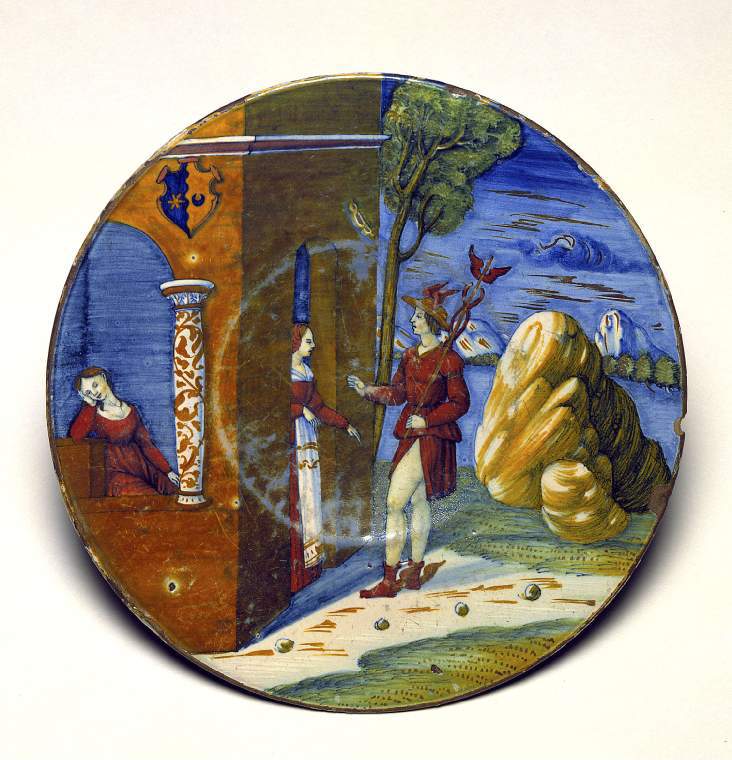Current Location: Gallery 6 (Upper Marlay): case 3, shelf D
Titles
Mercury, Herse and Aglauros
Maker(s)
Workshop:
Maestro Giorgio Andreoli
Entities
Categories
Description
Tin-glazed earthenware plate, painted on the front in polychrome, with Mercury, Herse and Aglauros.
Buff earthenware, tin-glazed overall; the reverse pale beige. Painted in blue, green, yellow, and orange; red and shades of yellow-gold lustre. Shape 50. Circular with slightly sloping rim and shallow depression in the middle, standing on a footring.
Mercury, Herse and Aglauros. Mercury stands holding his rod in his left hand, his right extended towards Aglauros who stands in the doorway of the palace. On the left, Herse sits indoors beside a window, resting her head on her right hand. The arch of the window springs from a column decorated with scrolling foliage. On the wall above is a shield charged with the arms party per pale undy azure and or (shown orange) a mullet and a crescent counterchanged. In the foreground there are four pebbles on the path, and in the background to right, rocks and a large expanse of sky.
The back is marked in the middle in thick orange-yellow lustre, `1522/.M o .o G' (both o raised). The base is encircled by a wide blue band and a narrow lustre band repeated in reverse order next to the rim. Between these are four crossed lozenges alternating with two spirals between curved strokes and two groups of spots between curved strokes.
Notes
History note: Henry T. Hope, Deepdene, Surrey; his daughter, Henrietta Adela Hope, who married in 1861 the Earl of Lincoln, later 6th Duke of Newcastle-under-Lyme (1834-1979); by descent to the 7th Duke of Newcastle-under-Lyme (1864-1928); sold by Christie's, 7 July 1921, Catalogue of fine old English silver-gilt plate, Limoges enamels, old Italian majolica and porcelain, the property of his grace the Duke of Newcastle, and removed from Clumber, Worksop, lot 120; George A. Lockett; Christie's, 11 June 1942, The choice collection of objects of art and furniture formed by the late George A. Lockett Esq., lot 217; Alfred Spero (£556); from 1943, L.C.G. Clarke, Leckhampton, MA, LL.D., Cambridge (1881-1960) by whom bequeathed
Legal notes
L.C.G. Clarke Bequest
Measurements and weight
Diameter: 26.0 cm
Height: 2.7 cm
Acquisition and important dates
Method of acquisition: Bequeathed
(1961-04-27)
by
Clarke, Louis Colville Gray
Dating
16th Century, Early
Renaissance
Production date:
dated
AD 1522
Note
The arms occur on two more plates painted by the same hand, and also dated 1522. A plate painted with the Fall of Phaeton in the Hermitage, St Petersburg, and another painted with a woman holding a dagger and taunting a young man, in the Metropolitan Museum of Art, New York. They were probably decorated by the painter of a dish decorated with the Judgement of Paris, in Maestro Giorgio's workshop in Gubbio on 2 October 1520, which is in the Petit Palais, Paris.
The subject was taken from the Roman poet Ovid's Metamorphoses, II, 708-832. The scene could illustrate Mercury's first or second visit to Cecrops' palace to see Herse with whom he had fallen in love. On the first occasion he was met by her sister Aglaurus who declined to lead him to Herse, and demanded gold for her compliance before sending him away. On his return, Aglaurus, who had become extremely envious of Herse's good fortune in attracting a lover, barred the way to her room. Thereupon Mercury exercised his supernatural power to open the door and transformed Aglaurus into stone.The figures of Mercury and Aglauros were derived from a woodcut in 'Ovidio metamorphoseos vulgare', Venice, 1497, p. XVIIIv, or in one of the Latin or Italian editions published in 1505, 1508, 1509, 1513, and 1517.
School or Style
Renaissance
People, subjects and objects depicted
Components of the work
Decoration
composed of
high-temperature colours
( blue, yellow, green and orange)
reduced pigment lustre
( copper appearing red)
reduced pigment lustre
( silver-yellow, appearing yellow-gold)
Materials used in production
Tin-glaze
Earthenware
Techniques used in production
Tin-glazing
: Buff earthenware, tin-glazed overall; the reverse appearing pale beige. Painted in blue, green, yellow, and orange; red and shades of yellow-gold lustre.
Inscription or legends present
Inscription present: rectangular, a ducal crown over a gothic N and to the right 'CLUMBER/2603'
- Text: CLUMBER/2603
- Location: On back
- Method of creation: Printed in black
- Type: Label
Inscription present: both o raised
- Text: 1522/.M o .o G
- Location: On the back
- Method of creation: In thick orange-yellow lustre
- Type: Inscription
References and bibliographic entries
Related exhibitions
Identification numbers
Accession number: C.79-1961
Primary reference Number: 79248
Stable URI
Audit data
Created: Saturday 6 August 2011
Updated: Monday 25 March 2024
Last processed: Wednesday 14 May 2025
Associated departments & institutions
Owner or interested party:
The Fitzwilliam Museum
Associated department:
Applied Arts




